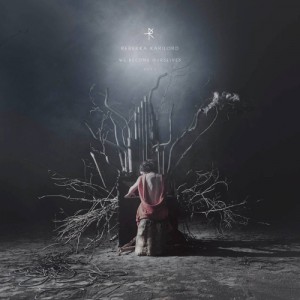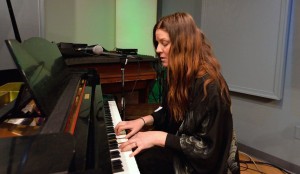Rebekka Karijord's Priests and Poets.
Podcast: Play in new window | Download
Subscribe: RSS
Listen to this interview above or download from itunes.
 Earlier this year we saw the U.S. release of Rebekka Karijord’s 2012 album, We Become Ourselves. She came over from her home in Sweden to play live and talk about her music and life.
Earlier this year we saw the U.S. release of Rebekka Karijord’s 2012 album, We Become Ourselves. She came over from her home in Sweden to play live and talk about her music and life.
If you hear a church like quality in some of Rebekka Karijord’s music, there’s a reason for that.
“My stepfather was a priest and I grew up singing a lot,” Karijord recalled, “I had my own key to his church up in northern Norway, and I could go and play the church organ whenever I wanted to. So I wrote some songs up there when I was younger. But I think I came back to that kind of sonic universe because when I wrote We Become Ourselves. I was in a very existential period of my life”.
Appropriately, perhaps, the first track on the album is called “Prayer”.
“The album was written when I lived up in the nature outside Stockholm, and I had a little cabin,’ she reminisces, looking back 4 years. “It was in a period where that was quite existential for me and I think ‘Prayer’, maybe you can call it religious, but with nature as the religion and human body as the church. And it’s a prayer for something to last, a relationship or something like a safety or a pureness to be kept intact.”
Karijord coupled this sentiment with music that has the elevating fervor of gospel. She explains, “In this record I really wanted to make something that was almost like influenced by the old blues, you know, slave songs…something like really physical…the mantra to get into the body in a way”.
Sitting at a grand piano at Echoes, Rebekka Karijord looks younger than her nearly 40 years. She has long auburn hair and wearing a black print kimono jacket over a sleeveless blouse. She didn’t come to music until late in her career. Acting was her initial profession.
 “I was an actor when I was younger as well,” she added, “I studied both music and acting and I went to the National Academy of Acting in Sweden. And I was acting in films since I was 12 to 30-ish. And then I felt okay, I’ve done this now and I’m done with it. I didn’t want to do it anymore. And then music took over”.
“I was an actor when I was younger as well,” she added, “I studied both music and acting and I went to the National Academy of Acting in Sweden. And I was acting in films since I was 12 to 30-ish. And then I felt okay, I’ve done this now and I’m done with it. I didn’t want to do it anymore. And then music took over”.
The spirit of song was already there. Her birth father had been a musician and even though her parents had separated when she was only three, Karijord stayed in contact with him through music.
“My dad was a fantastic musician when he was young,” she recalled, “but he suffered from a drug addiction, so he was away. I grew up with my super steady mom and had a nice upbringing in that regard, but him and the music became something that formed my personality in a way. And when I was older, I inherited all his lyrics. He gave them to me. So I started to send tapes to him, and we sent tapes back and forth and in an indirect way he kind of gave me music without realizing”.
It’s hard to think that this experience isn’t part of her album, We Become Ourselves, especially songs like “Save Yourself”. Her father wasn’t the only man who inspired many of the songs on We Become Ourselves. The album was actually created when she fell in love.
“I had fallen in love very profoundly, maybe for the first time, and it was something that came out of that. There was sort of an existentialism. It was like finding a connection to nature, and a connection to my own mortality and my timeline, in a way, and I wanted to express that in music”.
These are not simple love songs. “Oh Brother” is an ode and a lament for men who have been in her life, but not in the way you might expect.
“It’s an ode to all the amazing men I have around me that are struggling in their man role in these modern times,” she says. “It’s to the fathers, and the brothers, and the friends and the lovers and all of those who really are trying their best. I mean of course, I’m a feminist, but first and foremost I’m a humanist and I think we have to acknowledge that we all have the same needs deep down. There’s a sentence in the song saying ‘If I ever had a son, I’d teach him it’s okay to cry’.”
Rebekka Karijord’s church upbringing also plays into the final song on her album, a piece inspired by the tragedy of the 2011 Norwegian terrorist attacks on a government building and a children’s camp. Although Karijord lives in Sweden, she was born and raised in Norway and it hit close to home.
“It’s called “Bandages” and it’s the one where the boys choir is really present. And I was in the middle of recording and I opened the news in my laptop. And I couldn’t continue. Because it was so close, you know. I knew people there. And so I wrote this song and it felt like a good ending, like it’s kind of a prayer as well”.
Although Rebekka Karijord doesn’t act anymore, films called her back, this time as a composer.
“My film contacts and my theater contacts and my modern dance, everything I’d been working with as an actor, they were still there,” she enthuses. “ And they heard the music that I did and they wanted me to try to compose for films and so it slowly has evolved”.
She’s composed for dozens of film, TV and theater works and last year released an all-instrumental album of her scores called appropriately, Music for Film and Theater. Her scores tend to be much more avant-garde in sound.
“I love researching sonic universes,” she muses, “When you don’t use your voice in that same way it just opens up all these possibilities”.
Rebekka Karijord lives in a world of possibilities. She had a baby girl shortly after recording We Become Ourselves and she’s currently working on a project using only women’s voices. Her latest albums are We Become Ourselves and Music for Film and Theatre, both on Control Freak Kitten Records.
Listen to this interview at the top of this post or download from itunes.
